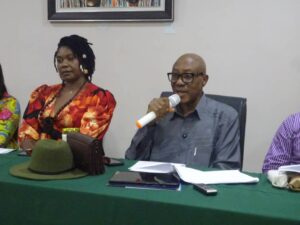What Nigerians can learn from “Calabar” people

By Azuka Onwuka
It is doubtful if there is any ethnic group in the southern part of Nigeria that is more derided than the ethnic groups in Akwa Ibom and Cross River states, which most Nigerians prefer to categorise as “Calabar people.” Even though the Ibibio and Efik are the largest groups in these two states, there are other ethnic groups like the Annang, Oron, Ibeno, Obolo, and various ethnic groups under the Ogoja province like Bekwara, Ekajuk, Bokyi, Efutop, etc. No comedian ever leaves a stage without a joke about Okon or Ekaette. And in such jokes, Okon is always a house boy, a cleaner or chauffeur, while Ekaette is a house girl, a cleaner or a cook.
When James Iroha created the TV comedy series called the New Masquerade, he took the role of Gringory of Ikot Ekpene, a house boy to Chief Zebrudaya. Unlike Clarus (his fellow houseboy who was Igbo), Gringory was simple-minded, old-fashioned and timid. His accent alone made viewers laugh.
The peoples of Akwa Ibom and Cross River states seem to have even resigned to fate over this stereotyping. They find such jokes funny and rarely protest. They have even joined in the stereotyping, with Ime ‘Bishop’ Umoh featuring in a series of Okon films, where he acts the role of an unrefined but good-natured village man who goes to the city and does everything the wrong way, including ironing his master’s socks.
But while ridiculing the people from these two states, Nigerians have failed to see the sterling qualities of these people and the silent progress they are making in almost all areas of life.
First of all, have you noticed that if two people are quarrelling or fighting in the street of a big city, it is rare for any of them to be an indigene of Akwa Ibom or Cross River? There seems to be a gene in them that abhors quarrels and violence.
I asked 10 Nigerians who are not highly politically conscious to give me the names of the top three oil-producing states. Only one of them mentioned Akwa Ibom, even though Akwa Ibom State is the number one. The reason is simple: Akwa Ibom people, like their Cross River State neighbours, are not noisy and boastful.
None of the top Niger Delta militants is from Akwa Ibom or Cross River. During the years of militancy in the Niger Delta over petroleum, the two states were never mentioned as states where bombings and kidnapping were taking place.
It was therefore shocking to hear of violence in Akwa Ibom during the 2011 political campaign in which many lives were lost and property destroyed. But being that it was not in their character, that was not repeated.
Have you wondered why people preferred Akwa Ibom people as domestic servants? (Governor Godswill Akpabio asked all Akwa Ibom people doing menial jobs to return home some years ago). First is their humility: nobody wants a servant that feels too big to do his work. The second is their honesty. It is that honesty that some people misinterpret as lack of intelligence. A typical “smart” employee is always planning how to cut corners or steal from his boss. It is the honest servant that his or her boss gives money to go to the market to buy household things without the fear of any sharp practices. The third reason is that they are hard-working and dedicated. Everybody wants someone who gets things done, not the person who is full of excuses. They are also skilful.
One of the jokes “Nigerian madams” make about Akwa Ibom women is that any woman who keeps them at home is looking for trouble. They point at two reasons: the culinary skills of an Akwa Ibom woman and her ability to take care of a man in all ways. In making these jokes, such women ironically make fun of themselves: first, that an Akwa Ibom woman cooks better; second, that she has better wife qualities. Any woman who can take care of the eating needs and emotional needs of a man has already used the most potent juju to ensnare him. You can’t extricate the man out of the web of such a woman: the more you try, the more he willingly entangles himself. So, rather than feign vain superiority and mock the “Calabar women”, such Nigerian women should get off their high horses and beg these women to teach them their secret. It is apparent that the girls from Akwa Ibom and Cross River get groomed from the cradle on how to manage a home successfully.
That is why anywhere someone opens a “Calabar restaurant” in Nigeria or abroad, Nigerians and non-Nigerians flood the restaurant. In addition to their cooking skills, they have some of the healthiest as well as most popular dishes, top of which are the edikaikong (vegetable) and afang soups. These are cuisines (together with some other Nigerian cuisines) that should be exported round the world the way the Chinese, the French and Italians have exported theirs.
In terms of culture, it is doubtful if one can find more colourful cultural costumes like those from the two states. At national festivals, their troupes are a delight. A former Cross River State Governor, Mr. Donald Duke, took advantage of this to establish the Calabar Carnival as well as upgrade the Obudu Cattle Ranch, thereby making the state a tourist destination.
Among prominent Nigerians, names that readily come to mind from these two states include Chief (Mrs.) Margaret Ekpo (although born to Anambra parents), a founding mother of the nation, politician and women’s rights activist; Chief Eyo Ita, a founding father of the nation and politician; Justice Udo Udoma, a former Justice of the Supreme Court of Nigeria and Chief Justice of Uganda; Chief Louis Edet, first indigenous Inspector General of Police; General Philip Effiong, Head of State of the defunct Republic of Biafra; Chief Clement Isong, second Governor of the Central Bank of Nigeria; and Hogan Bassey, boxing champion.
In the business terrain today, there are Senator Udo Udoma, lawyer and businessman; Mr Larry Ettah, Group Managing Director of UACN Plc; Mr. Udeme Ufot, the Group Managing Director of SO&U Saatchi & Saatchi Group.
In sports and entertainment one easily remembers Super Eagles’ goalkeeper, Vincent Enyeama; Nollywood actresses, Ini Edo and Nse Ikpe; music producer, Cobhams Asuquo; and Nollywood producers, Eme Isong and Uduak Isong-Oguamanam.
Among the political figures of today are Mr. Donald Duke; Chief Victor Attah, a former Governor of Akwa Ibom; Mr. Godswill Akpabio, Governor of Akwa Ibom; Mr. Liyel Imoke, Governor of Cross River; Chief Edem Duke, Minister of Tourism; Senator Victor Ndoma-Egba, Senate Leader; Chief Ufot Ekaette, a former Secretary to the Government of the Federation and Minister of Niger Delta Affairs, etc.
However, despite the achievements of these figures, you hardly see anything to suggest that they are haughty. And most importantly, you rarely hear that they are enmeshed in scandals and controversies like their counterparts from other states.
Luckily, the two states seem to have been blessed with governors that have been driven by a desire to develop their states. And the states are better for it.
However, in the last decade, the states were bedevilled by a strange type of Christianity fixated on witches and wizards. The only thing most of the “prophets and pastors” saw in children was witchcraft. These children were abused, sent out of home or even killed. Thankfully, the state governors have intervened by rescuing and rehabilitating these abandoned or abused children as well as coming hard on the perpetrators of such evil.
The spirit of Akwa Ibom and Cross River is one that deserves emulation. It is an unobtrusive, subtle, gentle, humble but diligent spirit. It is so much unlike the arrogant, boisterous, flamboyant, and aggressive spirit of the typical Nigerian. It is the type of spirit that does not mind stooping to conquer. Silently but assuredly, the peoples of Akwa Ibom and Cross River are coming!









